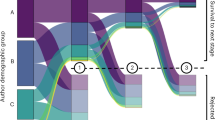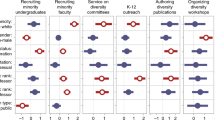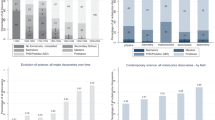Abstract
Scientific awards can shape scientific careers, helping to secure jobs and grants, but can also contribute to the lack of diversity at senior levels and in the elite networks of scientists. To assess the status quo and historical trends, we evaluated ‘best researcher’ awards and ‘best paper’ early- and mid-career awards from broad-scope international journals and societies in ecology and evolution. Specifically, we collated information on eligibility rules, assessment criteria and potential gender bias. Our results reveal that, overall, few awards foster equitable access and assessment. Although many awards now explicitly allow extensions of the eligibility period for substantial career interruptions, there is a general lack of transparency in terms of assessment and consideration of other differences in access to opportunities and resources among junior researchers. Strikingly, open science practices were mentioned and valued in only one award. By highlighting instances of desirable award characteristics, we hope this work will nudge award committees to shift from simple but non-equitable award policies and practices towards strategies enhancing inclusivity and diversity. Such a shift would benefit not only those at the early- and mid-career stages but the whole research community. It is also an untapped opportunity to reward open science practices, promoting transparent and robust science.
This is a preview of subscription content, access via your institution
Access options
Access Nature and 54 other Nature Portfolio journals
Get Nature+, our best-value online-access subscription
$29.99 / 30 days
cancel any time
Subscribe to this journal
Receive 12 digital issues and online access to articles
$119.00 per year
only $9.92 per issue
Buy this article
- Purchase on Springer Link
- Instant access to full article PDF
Prices may be subject to local taxes which are calculated during checkout




Similar content being viewed by others
Data availability
All analysed data for producing figures are available on GitHub (https://github.com/mlagisz/survey_ecoevo_awards) and archived on Zenodo (https://doi.org/10.5281/zenodo.7558224)71.
Code availability
All analysed code for producing figures are available on GitHub (https://github.com/mlagisz/survey_ecoevo_awards) and archived on Zenodo (https://doi.org/10.5281/zenodo.7558224)71.
References
Zuckerman, H. Stratification in American science. Sociol. Inq. 40, 235–257 (1970).
Merton, R. K. The Matthew effect in science. Science 159, 56–63 (1968).
Ma, Y. & Uzzi, B. Scientific prize network predicts who pushes the boundaries of science. Proc. Natl Acad. Sci. USA 115, 12608–12615 (2018).
Modgil, S., Gill, R., Lakshmi Sharma, V., Velassery, S. & Anand, A. Nobel nominations in science: constraints of the fairer sex. Ann. Neurosci. 25, 63–78 (2018).
Gibney, E. ‘More women are being nominated’: Nobel academy head discusses diversity. Nature https://doi.org/10.1038/d41586-019-02988-5 (2019).
Charlton, B. G. Which are the best nations and institutions for revolutionary science 1987–2006? Analysis using a combined metric of Nobel prizes, Fields medals, Lasker awards and Turing awards (NFLT metric). Med. Hypotheses 68, 1191–1194 (2007).
Naime, S. & Karroum, E. G. Women are underrepresented in major US sleep societies recognition awards. J. Clin. Sleep. Med. 17, 1665–1673 (2021).
Fang, A. C., Chekijian, S. A., Zeidan, A. J., Choo, E. K. & Sethuraman, K. N. National awards and female emergency physicians in the United States: is the ‘recognition gap’ closing? J. Emerg. Med. 61, 540–549 (2021).
Lincoln, A. E., Pincus, S., Koster, J. B. & Leboy, P. S. The Matilda effect in science: awards and prizes in the US, 1990s and 2000s. Soc. Stud. Sci. 42, 307–320 (2012).
Calaza, K. C. et al. Facing racism and sexism in science by fighting against social implicit bias: a Latina and Black woman’s perspective. Front. Psychol. 12, 671481 (2021).
Llorens, A. et al. Gender bias in academia: a lifetime problem that needs solutions. Neuron 109, 2047–2074 (2021).
Shandera, S., Matsick, J. L., Hunter, D. R. & Leblond, L. RASE: modeling cumulative disadvantage due to marginalized group status in academia. PLoS ONE 16, e0260567 (2021).
Cadwalader, E. L., Herbers, J. M. & Popejoy, A. B. in Gender Transformation in the Academy Vol. 19, 243–263 (Emerald Group, 2014).
Heffner, A. G. Authorship recognition of subordinates in collaborative research. Soc. Stud. Sci. 9, 377–384 (1979).
Sá, C., Cowley, S., Martinez, M., Kachynska, N. & Sabzalieva, E. Gender gaps in research productivity and recognition among elite scientists in the U.S., Canada, and South Africa. PLoS ONE 15, e0240903 (2020).
Trix, F. & Psenka, C. Exploring the color of glass: letters of recommendation for female and male medical faculty. Discourse Soc. 14, 191–220 (2003).
Hargrove, J. S. Gender bias in letters of recommendation. Fisheries 47, 289–289 (2022).
Skibba, R. Women postdocs less likely than men to get a glowing reference. Nature https://doi.org/10.1038/nature.2016.20715 (2016).
Ross, M. G. & Beall, M. H. Adult sequelae of intrauterine growth restriction. Semin. Perinatol. 32, 213–218 (2008).
Baum, J. & Martin, T. It is time to overcome unconscious bias in ecology. Nat. Ecol. Evol. 2, 201 (2017).
Moore, S., Neylon, C., Paul Eve, M., Paul O’Donnell, D. & Pattinson, D. ‘Excellence R Us’: university research and the fetishisation of excellence. Palgrave Commun. 3, 16105 (2017).
Allen, C. & Mehler, D. M. A. Open science challenges, benefits and tips in early career and beyond. PLoS Biol. 17, e3000246 (2019).
Hatch, A. & Curry, S. Changing how we evaluate research is difficult, but not impossible. eLife 9, e58654 (2020).
Meho, L. I. The gender gap in highly prestigious international research awards, 2001–2020. Quant. Sci. Stud. 2, 976–989 (2021).
Hansson, N. & Schlich, T. Beyond the Nobel Prize: scientific recognition and awards in North America since 1900. Notes Rec. https://doi.org/10.1098/rsnr.2022.0015 (2022).
James, A., Chisnall, R. & Plank, M. J. Gender and societies: a grassroots approach to women in science. R. Soc. Open Sci. 6, 190633 (2019).
Silver, J. K. et al. Women physicians underrepresented in American Academy of Neurology recognition awards. Neurology 91, e603–e614 (2018).
Wehi, P. M., Beggs, J. R. & Anderson, B. J. Leadership and diversity in the New Zealand Ecological Society. NZ J. Ecol. 43, 3368 (2019).
Watson, C. Women less likely to win major research awards. Nature https://doi.org/10.1038/d41586-021-02497-4 (2021).
Pourret, O. et al. Diversity, equity, and inclusion: tackling under-representation and recognition of talents in geochemistry and cosmochemistry. Geochim. Cosmochim. Acta 310, 363–371 (2021).
Krause, S. & Gehmlich, K. Does the Persistent Lack of Female Recipients of Academic Awards Have to Surprise us if few Scientific Prizes and Medals are Named after Women? (EGU General Assembly, 2022); https://doi.org/10.5194/egusphere-egu22-2562
Sanderson, K. Researchers voice dismay at all-male science Nobels. Nature https://doi.org/10.1038/d41586-021-02782-2 (2021).
Jan, Y. N. Underrepresentation of Asian awardees of United States biomedical research prizes. Cell 185, 407–410 (2022).
Jumreornvong, O. et al. Analysis of physician recipients of recognition awards from the American Academy of Physical Medicine and Rehabilitation by Race and Ethnicity. PM&R https://doi.org/10.1002/pmrj.12792 (2022).
Khelifa, R. & Mahdjoub, H. An intersectionality lens is needed to establish a global view of equity, diversity and inclusion. Ecol. Lett. 25, 1049–1054 (2022).
Santamaría, L. & Mihaljević, H. Comparison and benchmark of name-to-gender inference services. PeerJ Comput. Sci. 4, e156 (2018).
Wanelik, K. M., Griffin, J. S., Head, M. L., Ingleby, F. C. & Lewis, Z. Breaking barriers? Ethnicity and socioeconomic background impact on early career progression in the fields of ecology and evolution. Ecol. Evol. 10, 6870–6880 (2020).
Ross-Hellauer, T. et al. Dynamics of cumulative advantage and threats to equity in open science: a scoping review. R. Soc. Open Sci. 9, 211032.
Olejniczak, A. J. & Wilson, M. J. Who’s writing open access (OA) articles? Characteristics of OA authors at Ph.D.-granting institutions in the United States. Quant. Sci. Studies 1, 1429–1450 (2020).
Albornoz, D. et al. Framing Power: Tracing Key Discourses in Open Science Policies (ElPub, 2018); https://doi.org/10.4000/proceedings.elpub.2018.23
Bezuidenhout, L. & Havemann, J. The varying openness of digital open science tools. F1000Research 9, 1292 (2021).
Ross-Hellauer, T. Open science, done wrong, will compound inequities. Nature 603, 363–363 (2022).
Grahe, J. E., Cuccolo, K., Leighton, D. C. & Cramblet Alvarez, L. D. Open science promotes diverse, just, and sustainable research and educational outcomes. Psychol. Learn. Teach. 19, 5–20 (2020).
Armeni, K. et al. Towards wide-scale adoption of open science practices: the role of open science communities. Sci. Public Policy 48, 605–611 (2021).
Hoppeler, H. The San Francisco declaration on research assessment. J. Exp. Biol. 216, 2163–2164 (2013).
Strinzel, M., Brown, J., Kaltenbrunner, W., de Rijcke, S. & Hill, M. Ten ways to improve academic CVs for fairer research assessment. Humanit. Soc. Sci. Commun. 8, 251 (2021).
Holmes, M. A., Myles, L. & Schneider, B. Diversity and equality in honours and awards programs—steps towards a fair representation of membership. Adv. Geosci. 53, 41–51 (2020).
Wong, V. N. L. & Shaw, J. D. Build diversity among science prize winners. Nature 580, 185–185 (2020).
Mervis, J. NSF’s Uphill Road to Making Prestigious Early Career Award More Diverse (ScienceInsider, 2017); https://www.science.org/content/article/nsf-s-uphill-road-making-prestigious-early-career-award-more-diverse
Dutt, K., Pfaff, D. L., Bernstein, A. F., Dillard, J. S. & Block, C. J. Gender differences in recommendation letters for postdoctoral fellowships in geoscience. Nat. Geosci. 9, 805–808 (2016).
Madera, J. M., Hebl, M. R., Dial, H., Martin, R. & Valian, V. Raising doubt in letters of recommendation for academia: gender differences and their impact. J. Bus. Psychol. 34, 287–303 (2019).
Go, C. & Sachdev, U. Letters of recommendation: nuanced bias or useful affirmation? J. Vasc. Surg. 74, 29S–32S (2021).
Parrilla Gutierrez, J. M. Support letters: mostly ghost-written, always glowing. What’s the point? Nature https://doi.org/10.1038/d41586-021-02374-0 (2021).
Wilkes, R. Retire the letter of reference. Science 351, 630–630 (2016).
Liu, O. L., Minsky, J., Ling, G. & Kyllonen, P. Using the standardized letters of recommendation in selection: results from a multidimensional Rasch model. Educ. Psychol. Meas. 69, 475–492 (2009).
Jamieson, K. H., McNutt, M., Kiermer, V. & Sever, R. Signaling the trustworthiness of science. Proc. Natl Acad. Sci. USA 116, 19231–19236 (2019).
O’Dea, R. E. et al. Towards open, reliable, and transparent ecology and evolutionary biology. BMC Biol. 19, 68 (2021).
Perrier, L., Blondal, E. & MacDonald, H. The views, perspectives, and experiences of academic researchers with data sharing and reuse: a meta-synthesis. PLoS ONE 15, e0229182 (2020).
Mejlgaard, N. et al. Research integrity: nine ways to move from talk to walk. Nature 586, 358–360 (2020).
Hill, B., Secker, J. & Davidson, F. in Gender Transformation in the Academy Vol. 19, 85–107 (Emerald Group, 2014).
Choudhury, S. & Aggarwal, N. K. Reporting grantee demographics for diversity, equity, and inclusion in neuroscience. J. Neurosci. 40, 7780–7781 (2020).
Else, H. & Perkel, J. M. The giant plan to track diversity in research journals. Nature 602, 566–570 (2022).
Diversity in science prizes: why is progress so slow? Nature 606, 433–434 (2022).
Gibney, E. Women more likely to win awards that are not named after men. Nature https://doi.org/10.1038/d41586-022-01506-4 (2022).
Prisle, N. & Salamon, K. L. ‘Things take time’—but how long is that, exactly? Language as a structural barrier contributing to the underrepresentation of women, ethnic, and linguistic minorities in Academia. In Proc. 20th EGU General Assembly 15816 (EGU, 2018).
Kozlowski, D., Larivière, V., Sugimoto, C. R. & Monroe-White, T. Intersectional inequalities in science. Proc. Natl Acad. Sci. USA 119, e2113067119 (2022).
Cohen, G. L., Steele, C. M. & Ross, L. D. The mentor’s dilemma: providing critical feedback across the racial divide. Personal. Soc. Psychol. Bull. 25, 1302–1318 (1999).
Wickham, H. et al. Welcome to the Tidyverse. J. Open Source Softw. 4, 1686 (2019).
R Core Team. R: A Language and Environment for Statistical Computing (R Foundation for Statistical Computing, 2013).
Bates, D., Mächler, M., Bolker, B. & Walker, S. Fitting linear mixed-effects models using lme4. J. Stat. Softw. 67, 1–48 (2015).
Lagisz, M. et al. Data and code for: ‘Little transparency and equity in scientific awards for early and mid-career researchers in ecology and evolution’. Zenodo https://doi.org/10.5281/zenodo.7558224 (2023).
Acknowledgements
This project was supported by a grant from the European Society for Evolutionary Biology (ESEB) Equal Opportunities Initiative in October 2021.
Author information
Authors and Affiliations
Contributions
Conceptualization, methodology, data curation, visualization, funding acquisition and preparation of the original draft were undertaken by M.L. Formal analysis and supervision were by S.N. Data curation and investigation were carried out by U.A., B.A., J.R., A.S.-M. and C.E.L. All authors reviewed and edited the final manuscript.
Corresponding author
Ethics declarations
Competing interests
M.L. received funding from ESEB. The funder had no role in study design, data collection, data analyses, visualization or interpretation. M.L. is a regular member of ESEB and a Chair of the Equity Diversity and Inclusion Committee of SORTEE. U.A. is a member of ESEB, SSE, AES and SORTEE. B.A. is a SORTEE member. S.N. is a member of ESEB and SORTEE. All remaining authors declare no competing interests.
Peer review
Peer review information
Nature Ecology & Evolution thanks Antica Culina and the other, anonymous, reviewer(s) for their contribution to the peer review of this work. Peer reviewer reports are available.
Additional information
Publisher’s note Springer Nature remains neutral with regard to jurisdictional claims in published maps and institutional affiliations.
Supplementary information
Supplementary Information
Supplementary Methods, Tables 1–8 and Figs. 1–9.
Rights and permissions
Springer Nature or its licensor (e.g. a society or other partner) holds exclusive rights to this article under a publishing agreement with the author(s) or other rightsholder(s); author self-archiving of the accepted manuscript version of this article is solely governed by the terms of such publishing agreement and applicable law.
About this article
Cite this article
Lagisz, M., Aich, U., Amin, B. et al. Little transparency and equity in scientific awards for early- and mid-career researchers in ecology and evolution. Nat Ecol Evol 7, 655–665 (2023). https://doi.org/10.1038/s41559-023-02028-6
Received:
Accepted:
Published:
Issue Date:
DOI: https://doi.org/10.1038/s41559-023-02028-6
This article is cited by
-
A narrative on diversity, equity, and inclusion in surgery: insights from the European Society of Coloproctology and identification of points for action
Updates in Surgery (2024)
-
Recognizing Excellence in Maternal and Child Health (MCH) Epidemiology: The National MCH Epidemiology Awards
Maternal and Child Health Journal (2024)



